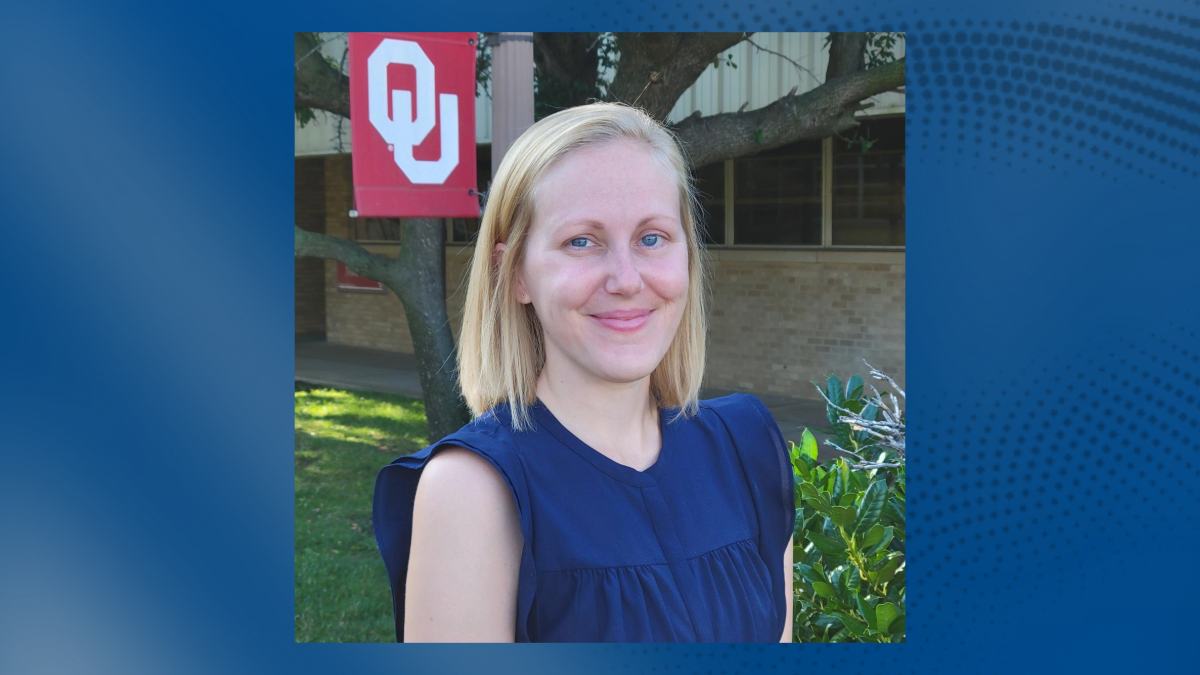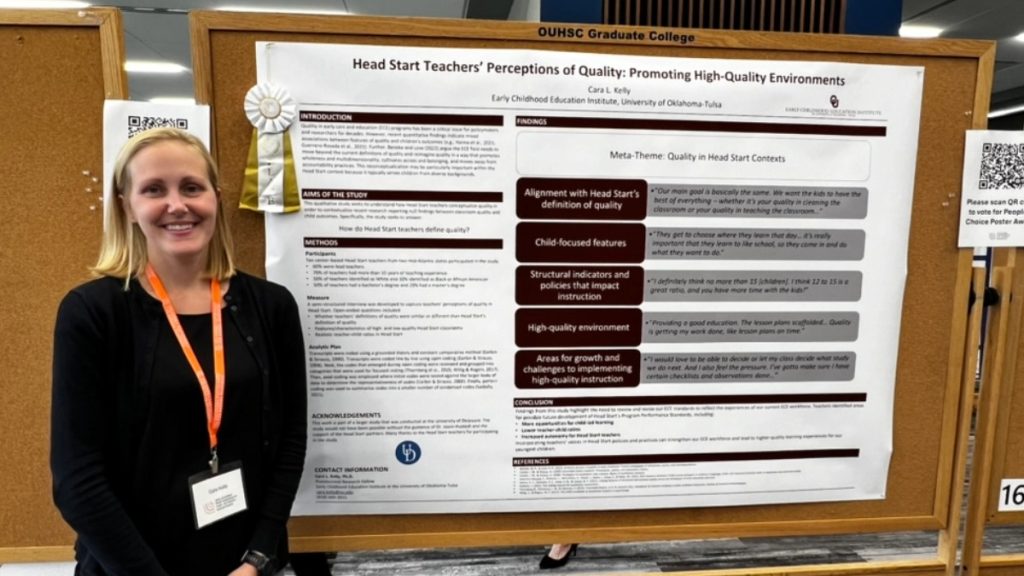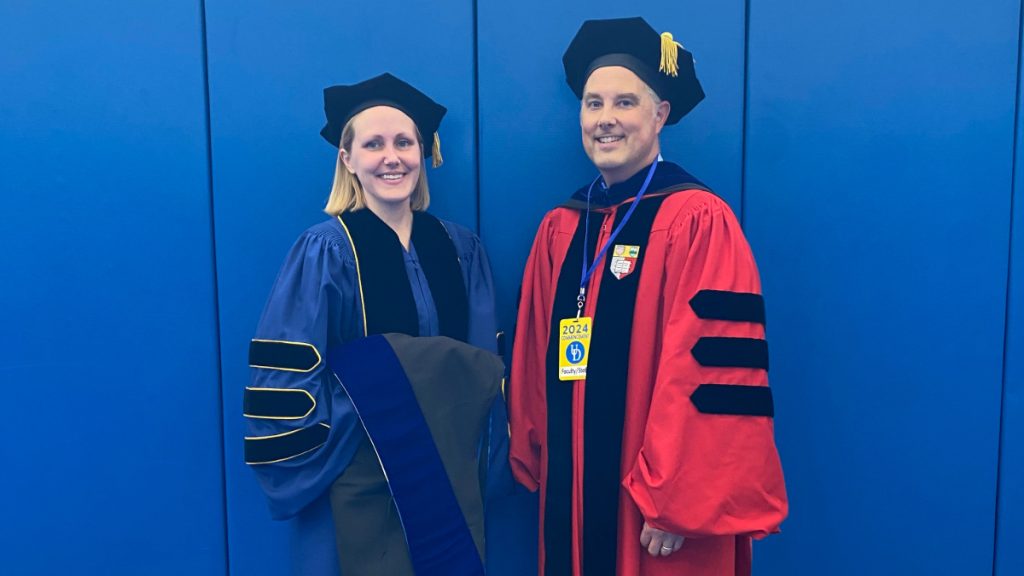Outstanding Dissertation Contributions During Women’s History Month

Alum Cara Kelly will receive national dissertation award for her research in early childhood education
It’s been less than a year since Cara Kelly, EHD24PhD, graduated from University of Delaware’s College of Education and Human Development, but she’s already making a difference with her research in early care and education. She has published articles on early care and education quality, received a national research grant and will soon receive the 2025 Outstanding Dissertation Award from the American Educational Research Association’s (AERA) Early Education and Child Development special interest group.
This annual award recognizes exceptional dissertations on topics related to the development of children between birth and age eight, including studies focused on families, teachers and others who care for and educate young children. Kelly’s dissertation investigated teacher perceptions of quality in the federal Head Start program, which provides early childhood education (ECE), health and social services to low-income families.
“I was honored to discover I had received such a prestigious award for my dissertation,” said Kelly, who is now a postdoctoral research fellow in the Early Childhood Education Institute at the University of Oklahoma-Tulsa.
Early childhood education contributions
Kelly’s interest in ECE began during her time as a master’s student in teaching, learning and advocacy at the College of Charleston in South Carolina.
“I became interested in quality in kindergarten classrooms and the experiences of the children in those classrooms, particularly students with disabilities and students living in the context of poverty,” Kelly said. “During my first year in CEHD’s Ph.D. in Human Development and Family Sciences (HDFS) program, I learned about ECE programs and policies and realized that quality in ECE is even less regulated than it is in the K-12 education system. This made me more curious about the influence of ECE quality on children’s short- and long-term outcomes.”
Kelly’s dissertation examined Head Start teachers’ perceptions of quality, allowing teachers to rate priorities emphasized by the federal Head Start program and respond to open-ended questions about quality.
“Cara’s dissertation project explored deeper implications and understandings of how the concept of ‘quality’ is truly understood by Head Start teachers,” said Heidi Beck, director of New Directions Early Head Start and interim co-director of CEHD’s Delaware Institute for Excellence in Early Childhood Education. “Having this kind of data to use as we develop policies for early childhood education opens a doorway to providing more valuable benefits for the children and families that our programs serve.”

Kelly’s results provided nuanced information about teachers’ perceptions of quality and the accountability tools used in the Head Start program. For example, teachers identified areas for future development related to Head Start’s current program performance standards, as well as the need to prioritize other measures of quality.
“Cara’s dissertation research is of great policy relevance, given that the findings reveal a possible mismatch between Head Start priorities and the perspectives of teachers who must carry them out on a day-to-day basis,” said Jason Hustedt, professor and chair of CEHD’s Department of HDFS, who nominated Kelly for the award. “Cara has done extensive analyses of national datasets, but was determined to form new partnerships with community agencies to collect her own dissertation data in local communities.”
Kelly’s focus on the perceptions and experiences of ECE teachers is especially relevant to national Women’s History Month this March. Women make up the majority of the ECE workforce, but their work is traditionally undervalued.
“Early childhood is a critical period for children’s development, and early relationships with teachers play an important role in children’s development,” Kelly said. “However, early childhood teachers are experiencing heightened stress, burnout and financial insecurity as a result of their job demands and low pay. These experiences are not only detrimental for early childhood teachers, but they can impact children as well.”
Kelly’s CEHD experience
Kelly credits CEHD’s doctoral program with providing the foundation for her research accomplishments. In addition to her coursework and research experiences, Kelly especially values the mentorship she received from CEHD faculty members like Hustedt and Anamarie Whitaker, assistant professor professor in HDFS.
“I was very fortunate to have excellent mentors during my time at UD,” Kelly said. “My advisor, Jason Hustedt, was a huge supporter of my success, and he helped me narrow down my research interests while building my skills as a scholar. I was also fortunate to work with Anamarie Whitaker. Working with Ana helped me gain the statistical skills and knowledge I needed to be a more competitive candidate on the job market, and she continues to be a champion of my success.”

Currently, Kelly is working with Whitaker on a project that examines historical changes in Head Start’s population and entry level skills. In October 2024, Kelly and Whitaker received a grant from the U.S. Department of Health and Human Services’ Administration for Children and Families to support this work.
Kelly will officially receive the Outstanding Dissertation Award during the AERA annual meeting in April.
To learn more about CEHD research in early childhood, visit its research webpage.
Article by Jessica Henderson. Photos courtesy of Cara Kelly.



